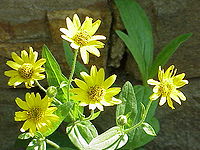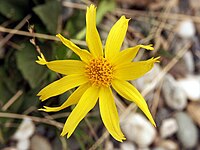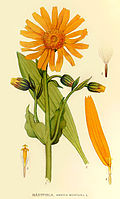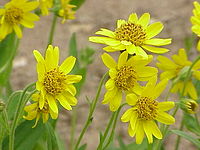Arnica: Difference between revisions
No edit summary |
DocWatson42 (talk | contribs) Cleaned up image placement (to prevent the overrunning of the appendices in wide browser windows) and other matters. |
||
| (554 intermediate revisions by more than 100 users not shown) | |||
| Line 1: | Line 1: | ||
{{Short description|Genus of flowering plants}} |
|||
| ⚫ | |||
{{Automatic taxobox |
|||
| image = Arnica_montana_-_Köhler–s_Medizinal-Pflanzen-015.jpg |
|||
| image_caption = ''[[Arnica montana]]''<ref>[https://www.biodiversitylibrary.org/page/303584 1897 illustration from Franz Eugen Köhler, Köhler's Medizinal-Pflanzen]</ref> |
|||
| display_parents = 3 |
|||
| parent_authority = B.G.Baldwin |
|||
| taxon = Arnica |
|||
| authority = [[Carl Linnaeus|L.]] 1753 not Boehm. 1760 |
|||
| synonyms_ref = |
|||
| synonyms = |
|||
* ''Mallotopus'' <small>Franch. & Sav.</small> |
|||
* ''Whitneya'' <small>A.Gray</small> |
|||
* ''Gerbera'' <small>Boehm.</small> |
|||
* ''Aliseta'' <small>Raf.</small> |
|||
* ''Epiclinastrum'' <small>Bojer ex DC.</small> |
|||
* ''Aphyllocaulon'' <small>Lag.</small> |
|||
}} |
|||
'''''Arnica''''' {{IPAc-en|ˈ|ɑːr|n|ᵻ|k|ə}} is a genus of [[perennial plant|perennial]], herbaceous plants in the sunflower family ([[Asteraceae]]). The genus name ''Arnica'' may be derived from the [[Greek language|Greek]] ''[[wikt:arni|arni]]'', "lamb", in reference to the plants' soft, hairy leaves. ''Arnica'' is also known by the names '''''mountain tobacco''''' and, confusingly, '''''leopard's bane''''' and '''''wolfsbane'''''—two names that it shares with the entirely unrelated genus ''[[Aconitum]]''. |
|||
Family: N.O. Compositae |
|||
This [[Circumboreal Region|circumboreal]] and montane (subalpine) genus occurs mostly in the temperate regions of western [[North America]], with a few species native to the [[Arctic Circle|Arctic]] regions of northern [[Eurasia]] and [[North America]].<ref>[http://luirig.altervista.org/flora/taxa/index1.php?scientific-name=arnica+montana Altervista Flora Italiana, Arnica, ''Arnica montana'' L. ] includes photos and European distribution maps</ref> |
|||
Also known as: Leopard's bane, Wolf's bane, Mountain tobacco |
|||
''Arnica'' species are used as food plants by the [[larva]]e of some [[Lepidoptera]] species, including ''[[Bucculatricidae|Bucculatrix arnicella]]''. |
|||
Used as a homoeopathic medicament. When the herb is in bloom the entire plant can be used. |
|||
''Arnica'' was previously classified in the tribe [[Senecioneae]] because it has a flower or [[pappus (flower structure)|pappus]] of fine bristles. |
|||
==Characteristics== |
|||
''Arnica'' plants have a deep-rooted, erect [[Plant stem|stem]] that is usually unbranched. Their downy [[opposite leaves]] are borne towards the apex of the stem. The ovoid, leathery basal leaves are arranged in a rosette.<ref name=n>[http://www.efloras.org/florataxon.aspx?flora_id=1&taxon_id=102636 Flora of North America, ''Arnica'' Linnaeus]</ref> |
|||
They show large yellow or orange [[flower]]s, {{convert|6–8|cm|abbr=on|sigfig=1}} wide with {{convert|10–15|cm|abbr=on|sigfig=1}} long ray florets and numerous disc florets. The [[phyllary|phyllaries]] (a [[bract]] under the flowerhead) has long spreading hairs. Each phyllary is associated with a ray floret. Species of ''Arnica'', with an [[involucral bract|involucre]] (a circle of bracts arranged surrounding the flower head) arranged in two rows, have only their outer phyllaries associated with ray florets. The flowers have a slight [[aroma compound|aromatic]] smell.<ref name=n/> |
|||
The seedlike [[fruit]] has a [[pappus (botany)|pappus]] of plumose, white or pale tan bristles. The entire plant has a strong and distinct pine-sage odor when the leaves of mature plants are rubbed or bruised.<ref name=n/> |
|||
| ⚫ | |||
{{main|Arnica montana}} |
|||
The species ''Arnica montana'', native to [[Europe]], has long been used medicinally, but the effectiveness of this use has not been substantiated.<ref>{{cite journal |title=Efficacy of Homeopathic Arnica A Systematic Review of Placebo-Controlled Clinical Trials |author=E. Ernst |author2= M. H. Pittler |journal=JAMA Surgery |volume=133 |number=11 |date=November 1998 |pages=1187–1190 |doi=10.1001/archsurg.133.11.1187 |pmid=9820349|doi-access=free }}</ref> |
|||
===Toxicity=== |
|||
''Arnica montana'' contains the toxin [[helenalin]], which can be poisonous if large amounts of the plant are eaten, and contact with the plant can also cause skin irritation.<ref>{{cite web |url=http://www.ces.ncsu.edu/depts/hort/consumer/poison/Arnicmo.htm |title=Poisonous Plants: Arnica montana |publisher=Ces.ncsu.edu |access-date=2009-12-22 |archive-url=https://web.archive.org/web/20131017023928/http://www.ces.ncsu.edu/depts/hort/consumer/poison/Arnicmo.htm |archive-date=2013-10-17 |url-status=dead }}</ref> |
|||
==Species== |
|||
Accepted species:<ref>[http://www.theplantlist.org/tpl1.1/search?q=Arnica The Plant List search for ''Arnica'']</ref> |
|||
* ''[[Arnica acaulis]]''—Common leopardbane—eastern [[United States|US]] from [[Alabama]] to [[New Jersey]] |
|||
* ''[[Arnica angustifolia]]''—Narrowleaf arnica—[[Canada]] (from [[British Columbia]] to [[Quebec]]), US ([[Montana]], [[Idaho]], [[Wyoming]], [[Colorado]]); Russia, Scandinavia |
|||
* ''[[Arnica cernua]]''—Serpentine arnica—[[California]], [[Oregon]] |
|||
* ''[[Arnica chamissonis]]''—Chamisso arnica—US west of [[Rocky Mountains|Rockies]] including [[Alaska]]; [[Canada]] ([[British Columbia]] to [[Quebec]] plus [[Yukon]] + [[Northwest Territories]]) |
|||
* ''[[Arnica cordifolia]]''—Heart-leaf leopardbane, heartleaf arnica—US West of [[Rocky Mountains|Rockies]] plus [[Alaska]] + [[Michigan]]; [[Canada]] (from [[British Columbia]] to [[Quebec]] plus [[Yukon]] + [[Northwest Territories]]) |
|||
* ''[[Arnica dealbata]]''—[[California]] |
|||
* ''[[Arnica discoidea]]''—Rayless arnica—[[California]], [[Oregon]], [[Nevada]], [[Washington (state)|Washington]] |
|||
* ''[[Arnica fulgens]]''—Foothill arnica, orange arnica, shining leopardbane—USA (west of [[Rocky Mountains|Rockies]] plus [[Michigan]]); [[Canada]] (from [[British Columbia]] to [[Manitoba]]) |
|||
* ''[[Arnica gracilis]]''—Smallhead arnica (''A. latifolia'' x ''A. cordifolia'')—US ([[Montana]], [[Idaho]], [[Wyoming]], [[Colorado]], [[Oregon]], [[Washington (state)|Washington]]); [[British Columbia]], [[Alberta]], [[Northwest Territories]] |
|||
* ''[[Arnica griscomii]]''—[[Russia]], [[Canada]], [[Alaska]] |
|||
* ''[[Arnica intermedia]]''—eastern [[Russia]] ([[Yakutsk]]iya, [[Khabarovsk]], [[Magadan]]) |
|||
* ''[[Arnica lanceolata]]''—Arnica, lanceleaf arnica—US West of [[Rocky Mountains|Rockies]] plus [[Alaska]], [[Maine]] [[New Hampshire]], [[Vermont]], [[New York State]]; Canada ([[British Columbia]], [[Quebec]], [[New Brunswick]]) |
|||
* ''[[Arnica latifolia]]''—Broadleaf arnica—western US, western [[Canada]] |
|||
* ''[[Arnica lessingii]]''—Nodding arnica—[[Kamchatka]], [[Alaska]], [[Yukon]], [[Northwest Territories]], [[British Columbia]] |
|||
* ''[[Arnica lonchophylla]]''—Longleaf arnica—most of Canada; [[Alaska]], [[Montana]], [[Minnesota]], [[South Dakota]] |
|||
* ''[[Arnica longifolia]]''—Longleaf arnica, spearleaf arnica—US west of [[Rocky Mountains|Rockies]], [[British Columbia]], [[Alberta]] |
|||
* ''[[Arnica louiseana]]''—Lake Louise arnica—[[British Columbia]], [[Alberta]] |
|||
* ''[[Arnica mallotopus]]''—[[Honshu]] Island in [[Japan]] |
|||
* ''[[Arnica mollis]]''—Hairy arnica, wooly arnica——US West of [[Rocky Mountains|Rockies]] plus [[Alaska]], [[New Hampshire]] + [[Vermont]]; [[Canada]] (from [[British Columbia]] to [[Quebec]] plus [[Yukon]] + [[Northwest Territories]]) |
|||
* ''[[Arnica montana]]''—Mountain arnica—most of [[Europe]] plus [[Greenland]]; naturalized in [[India]] |
|||
* ''[[Arnica nevadensis]]''—Nevada arnica—[[California]], [[Oregon]], [[Nevada]], [[Washington (state)|Washington]] |
|||
* ''[[Arnica ovata]]''—[[British Columbia]] [[Alberta]], [[Yukon]], US West of [[Rocky Mountains|Rockies]] |
|||
* ''[[Arnica parryi]]''—Nodding arnica, Parry's arnica—[[British Columbia]], [[Alberta]], [[Yukon]], US West of [[Rocky Mountains|Rockies]] |
|||
* ''[[Arnica porsildiorum]]''—[[Kamchatka]], [[Yukon]] [[Northwest Territories]] |
|||
* ''[[Arnica rydbergii]]''—Rydberg arnica, Rydberg's arnica, subalpine arnica—[[British Columbia]], [[Alberta]], northwestern USA |
|||
* ''[[Arnica sachalinensis]]''—[[Hokkaido]], [[Sakhalin]], [[Kuril Islands|Kuril]], [[Irkutsk]] |
|||
* ''[[Arnica sororia]]''—Twin arnica—[[British Columbia]], [[Alberta]], [[Saskatchewan]], US West of [[Rocky Mountains|Rockies]] |
|||
* ''[[Arnica spathulata]]''—Klamath arnica—[[California]] [[Oregon]] |
|||
* ''[[Arnica unalaschcensis]]''—Alaska arnica—[[Hokkaido]], [[Honshu]], [[Kamchatka]], [[Sakhalin]], [[Kuril Islands|Kuril]], [[Alaska]] |
|||
* ''[[Arnica venosa]]''—Shasta County arnica—[[California]] |
|||
* ''[[Arnica viscosa]]''—Mt. Shasta arnica—[[California]], [[Oregon]] |
|||
<gallery widths="200px" heights="200px"> |
|||
Image:Arnica chamissonis0.jpg|''[[Arnica chamissonis]]'' |
|||
Image:Arnica griscomii.jpg|''[[Arnica griscomii]]'' in the Alaskan Interior |
|||
Image:Arnicamontana.jpg|[[Mountain arnica]] (''Arnica montana'') |
|||
Image:Arnica longifolia0.jpg|Longleaf arnica (''[[Arnica longifolia]]'') |
|||
</gallery> |
|||
==References== |
|||
{{Reflist}} |
|||
==External links== |
|||
{{Wiktionary}} |
|||
{{EB1911 poster|Arnica}} |
|||
* {{Cite AmCyc|wstitle=Arnica |short=x}} |
|||
{{Taxonbar|from1=Q693908|from2=Q55829762}} |
|||
{{Authority control}} |
|||
[[Category:Arnica| ]] |
|||
[[Category:Asteraceae genera]] |
|||
[[Category:Medicinal plants]] |
|||
[[Category:Taxa named by Carl Linnaeus]] |
|||
Latest revision as of 03:12, 1 May 2024
| Arnica | |
|---|---|

| |
| Arnica montana[1] | |
| Scientific classification | |
| Kingdom: | Plantae |
| Clade: | Tracheophytes |
| Clade: | Angiosperms |
| Clade: | Eudicots |
| Clade: | Asterids |
| Order: | Asterales |
| Family: | Asteraceae |
| Subfamily: | Asteroideae |
| Tribe: | Madieae |
| Subtribe: | Arnicinae B.G.Baldwin |
| Genus: | Arnica L. 1753 not Boehm. 1760 |
| Synonyms | |
| |
Arnica /ˈɑːrnɪkə/ is a genus of perennial, herbaceous plants in the sunflower family (Asteraceae). The genus name Arnica may be derived from the Greek arni, "lamb", in reference to the plants' soft, hairy leaves. Arnica is also known by the names mountain tobacco and, confusingly, leopard's bane and wolfsbane—two names that it shares with the entirely unrelated genus Aconitum.
This circumboreal and montane (subalpine) genus occurs mostly in the temperate regions of western North America, with a few species native to the Arctic regions of northern Eurasia and North America.[2]
Arnica species are used as food plants by the larvae of some Lepidoptera species, including Bucculatrix arnicella.
Arnica was previously classified in the tribe Senecioneae because it has a flower or pappus of fine bristles.
Characteristics
[edit]Arnica plants have a deep-rooted, erect stem that is usually unbranched. Their downy opposite leaves are borne towards the apex of the stem. The ovoid, leathery basal leaves are arranged in a rosette.[3]
They show large yellow or orange flowers, 6–8 cm (2–3 in) wide with 10–15 cm (4–6 in) long ray florets and numerous disc florets. The phyllaries (a bract under the flowerhead) has long spreading hairs. Each phyllary is associated with a ray floret. Species of Arnica, with an involucre (a circle of bracts arranged surrounding the flower head) arranged in two rows, have only their outer phyllaries associated with ray florets. The flowers have a slight aromatic smell.[3]
The seedlike fruit has a pappus of plumose, white or pale tan bristles. The entire plant has a strong and distinct pine-sage odor when the leaves of mature plants are rubbed or bruised.[3]
Arnica montana
[edit]The species Arnica montana, native to Europe, has long been used medicinally, but the effectiveness of this use has not been substantiated.[4]
Toxicity
[edit]Arnica montana contains the toxin helenalin, which can be poisonous if large amounts of the plant are eaten, and contact with the plant can also cause skin irritation.[5]
Species
[edit]Accepted species:[6]
- Arnica acaulis—Common leopardbane—eastern US from Alabama to New Jersey
- Arnica angustifolia—Narrowleaf arnica—Canada (from British Columbia to Quebec), US (Montana, Idaho, Wyoming, Colorado); Russia, Scandinavia
- Arnica cernua—Serpentine arnica—California, Oregon
- Arnica chamissonis—Chamisso arnica—US west of Rockies including Alaska; Canada (British Columbia to Quebec plus Yukon + Northwest Territories)
- Arnica cordifolia—Heart-leaf leopardbane, heartleaf arnica—US West of Rockies plus Alaska + Michigan; Canada (from British Columbia to Quebec plus Yukon + Northwest Territories)
- Arnica dealbata—California
- Arnica discoidea—Rayless arnica—California, Oregon, Nevada, Washington
- Arnica fulgens—Foothill arnica, orange arnica, shining leopardbane—USA (west of Rockies plus Michigan); Canada (from British Columbia to Manitoba)
- Arnica gracilis—Smallhead arnica (A. latifolia x A. cordifolia)—US (Montana, Idaho, Wyoming, Colorado, Oregon, Washington); British Columbia, Alberta, Northwest Territories
- Arnica griscomii—Russia, Canada, Alaska
- Arnica intermedia—eastern Russia (Yakutskiya, Khabarovsk, Magadan)
- Arnica lanceolata—Arnica, lanceleaf arnica—US West of Rockies plus Alaska, Maine New Hampshire, Vermont, New York State; Canada (British Columbia, Quebec, New Brunswick)
- Arnica latifolia—Broadleaf arnica—western US, western Canada
- Arnica lessingii—Nodding arnica—Kamchatka, Alaska, Yukon, Northwest Territories, British Columbia
- Arnica lonchophylla—Longleaf arnica—most of Canada; Alaska, Montana, Minnesota, South Dakota
- Arnica longifolia—Longleaf arnica, spearleaf arnica—US west of Rockies, British Columbia, Alberta
- Arnica louiseana—Lake Louise arnica—British Columbia, Alberta
- Arnica mallotopus—Honshu Island in Japan
- Arnica mollis—Hairy arnica, wooly arnica——US West of Rockies plus Alaska, New Hampshire + Vermont; Canada (from British Columbia to Quebec plus Yukon + Northwest Territories)
- Arnica montana—Mountain arnica—most of Europe plus Greenland; naturalized in India
- Arnica nevadensis—Nevada arnica—California, Oregon, Nevada, Washington
- Arnica ovata—British Columbia Alberta, Yukon, US West of Rockies
- Arnica parryi—Nodding arnica, Parry's arnica—British Columbia, Alberta, Yukon, US West of Rockies
- Arnica porsildiorum—Kamchatka, Yukon Northwest Territories
- Arnica rydbergii—Rydberg arnica, Rydberg's arnica, subalpine arnica—British Columbia, Alberta, northwestern USA
- Arnica sachalinensis—Hokkaido, Sakhalin, Kuril, Irkutsk
- Arnica sororia—Twin arnica—British Columbia, Alberta, Saskatchewan, US West of Rockies
- Arnica spathulata—Klamath arnica—California Oregon
- Arnica unalaschcensis—Alaska arnica—Hokkaido, Honshu, Kamchatka, Sakhalin, Kuril, Alaska
- Arnica venosa—Shasta County arnica—California
- Arnica viscosa—Mt. Shasta arnica—California, Oregon
-
Arnica griscomii in the Alaskan Interior
-
Mountain arnica (Arnica montana)
-
Longleaf arnica (Arnica longifolia)
References
[edit]- ^ 1897 illustration from Franz Eugen Köhler, Köhler's Medizinal-Pflanzen
- ^ Altervista Flora Italiana, Arnica, Arnica montana L. includes photos and European distribution maps
- ^ a b c Flora of North America, Arnica Linnaeus
- ^ E. Ernst; M. H. Pittler (November 1998). "Efficacy of Homeopathic Arnica A Systematic Review of Placebo-Controlled Clinical Trials". JAMA Surgery. 133 (11): 1187–1190. doi:10.1001/archsurg.133.11.1187. PMID 9820349.
- ^ "Poisonous Plants: Arnica montana". Ces.ncsu.edu. Archived from the original on 2013-10-17. Retrieved 2009-12-22.
- ^ The Plant List search for Arnica
External links
[edit]- . The American Cyclopædia. 1879.




